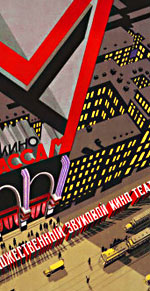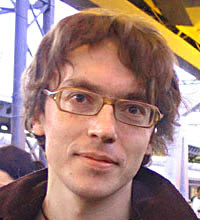
| Jacket 36 — Late 2008 | Jacket 36 Contents page | Jacket Homepage | Search Jacket |
This piece is about 7 printed pages long. It is copyright © Dmitry Vodennikov and Matvei Yankelevich and Peter Golub and Tatyana Golub and Jacket magazine 2008. See our [»»] Copyright notice. The Internet address of this page is http://jacketmagazine.com/36/rus-vodennikov-trb-yankelevich-golub-golub.shtml

Back to the Russian poetry Contents list
***
In a Soviet schoolboy uniform I drank the stilted air
and after twenty years: a rainstorm in July
and I tore out ―with longing, with the roots―
our names from letters we had sent.
With blood I tore up all that was between us,
like weeds, when the earth is in your hands:
a violet-yellow Vodennikov, and cornflower blue petite Asya,
Lena the tramp, and you, all red and black.
I threw it to the rainstorm, in July,
incommunicado, as they say:
dad, step-mom, mom, Andrei, Polina, Julia
(somehow Julia was especially hard to throw away).
But I said to my sister: don’t be afraid, dear
sister, and my brother, as i move
into the dark, I bless all those who lived with me,
I bless them with a purple belly, a blue-eyed brim,
with the storm that creeps into the letters and the leaves.
The other way around―through false and broken sleep,
through bouncing balls and shouting in the yard―
I hear it all: you are alive and well,
and planning a long life upon the earth.
But what am I to do with shards and fragments,
with the shred that’s torn apart in lilac gloom,
from Senya, the boy, my very own:
me, and this stupid love of mine.
Trans. Matvei Yankelevich
Translation(s) originally commissioned by CEC Artslink on the occasion of the author’s visit to the US as a participant in their Open World program.
WWIII
... and now: whatever you want,
not only this tv show “Resume”
and not just this politician with the beat-up eyes
and not these soldiers,
soldiers in bloody dust,
but who
will forgive them―them!―
for their ugly feet
(why do I keep on butting in, with my feet?)
for their ugly feet,
for their beautiful boots.
You, who walks bowlegged,
then perspires, sweats, into us,
then lies there, like aspic.
I get it now, you want it — just like this.
But it can’t be — only this way.
That’s not why we were asked to keep from shouting,
why they fed us sugar, but filled us with salt:
neither to degrade,
nor to beat, nor to kill―
none of this will I allow.
O, this crimson, rough, fresh juice―
it flies so, like an apple tree in April!
(and we’ll think it’s just more gunfire...)
“What’s that on your soles, mister?”
“Dirt, m-my b-boy.”
Oh, really...
Come one, get up already,
Arkharov, Barsukov,
Vodennikov, Ershova,
Sadretdinov,
Khokhlova, Kholomeyzer, Khokhlyakov,
Khmelyova, Yatsuki―I Cannot Bear it!
I’ve had it―up to here―with you,
and I am―in your hands,
you―you are like jelly (Sit Down!),
and me―I’m like a battery,
you―you are wearing such amazing boots today
(all of you in such amazing boots today!)
and I am without them,
and I am stronger―thank you
Trans. Matvei Yankelevich
Translation(s) originally commissioned by CEC Artslink on the occasion of the author’s visit to the US as a participant in their Open World program.
Draft
because poems don’t grow up like well behaved children,
but grow between the legs at night,
and only once a century are born
the poet is a fool, a father, and a flower
1.
Yes, it is exactly so (there are no other versions)
it all has left and burned all bridges, my protracted spring,
and arrived — finally — my long awaited ripeness.
Although, yesterday, why did you flicker and jump, why my satiated sly heart,
why did you flicker and jump, as if you’d lost your mind?
...I am standing on an April mountain — in a tightly sewed military coat,
I have four lives (reserved), I have a letter from you:
“Hello,” you write, “I am chronically ill,
And I don’t have a life to spare. Tomorrow I have chemotherapy.
However, I will try to survive — I will fight.
You are around, try to be happy.
Live, be cheerful when you get the chance.
And be afraid of nothing.” So I am trying.
2.
Well, go on and try then — perspiring, resurrected, ill —
record this line of life on a piece of ripped paper
(electronic, arboreal, green, heavenly, human)
and for this I will be to you — as everyone — grateful.
How much happiness is everywhere, so many strong animals and people!
...here comes Anton Ocherov, here chirps Kiril Medvedev,
and here a person (warms on a hot rock), for several years carrying
near me his voluntary presidio,
with a back broken since childhood, himself like a sun salamander,
to my constant: “O, my poor poor boy”
he answered:
“no, I’m happy...”
3.
These people stand in my head,
some stand waist deep in earth, some up to their shoulders in auburn grass,
some, death covers to the crown, while others are submerged in victory — without a trace.
These people won’t leave me anytime soon.
And those who squandered the majority of their quotidian battle
those who remained in Israel, in Latvia, in Poland, in the fields around Moscow,
We’ll take them too — like gunned blueberries
lain across the palms, on pants and skirts made of the sun, — with us.
4.
...We’re standing on an April mountain — in our stupid tightly woven coats,
Olya, Anastasia, and Roma and Petya and Sasha, and God knows who else:
with a laptop, a cell phone, in a birch grove, a heavenly pillar,
with head thrown back to the sky, clear, beloved, face
(because all people with beloved faces are pillars to the sky.)
I’ll teach you all — to speak from Sparrow Hills.
5.
“Hello,” one will say, “I am the only one
defending poetry from humiliation,
and I’m finally ready to sign up for that which caused them to reproach me.”
“Ah, none of this is poetry,”
this is my living, this-many-year-old voice,
that promised to make the woman I once loved, immortal,
and failing in this task, promised to make her somewhat happy...
“Hello,” says another, “If on some smoky April
after drinking half a bottle of vermouth (or whatever you guys drink)
you suddenly remember about me, nostalgic about your unfortunate lives,
Don’t Open My Books!
Don’t Resurrect My Paper Voice!
Don’t Disturb My Collapsed Body!”
“Because I loved you much more than you loved me,” the fourth will say,
“And I needed you much more than you needed me,
and so I won’t take your victory wand.
(what kind of a victor could I be now anyways?)”
6.
...However,
I do lay claim to the role of a human with a difficult masculine fate,
all that is left for me, is to step to the front,
kneel to the people (closer than the rest) and say:
“My dear people, poor, kind, half-living...
We are all a bit dead, we are all immortal and mendacious.
Therefore, try and live, if you can, with a bit of joy,
please, be happy and fear nothing
(except humiliation, decrepitude, and a cur’s death,
although, this is also nothing to fear).”
7.
Because all those, who couldn’t withstand the major battle,
those who were left in Paris, the hospital, the hut, in poems around Moscow,
will also be gathered, like scattered wild strawberries,
and in green palms be carried home.
Trans. Tr. Peter Golub
Breaking News
Keep in mind: when there is fire in your blood,
When around — such a bliss,
and leaf fall — such — everything goes dark before your eyes,
who to be with (and who not to be with),
who to belong to
It doesn’t matter to me.
A scar under the brow — love — from glass,
The burn — love — on a finger,
I always had too little, too little of everything,
and it turned out — too much, too much.
I swear, I did not look for love
in a life of leaf fall (why beat a dead horse),
I was looking — for mercy and protection,
and found — one — more — embrace.
Life, you often smell of blood,
life, you secretly got drunk with me,
and it never hurt to be together — it never did
when we were together it was so sweet, sweet.
It all started — shivering and flowing,
and continued — rough and clear,
and finished — atilt and powerful
so merciless.
Trans. Tr. Tatyana Golub

Dmitry Vodennikov
Dmitry Vodennikov (b. 1968 Moscow) has a degree in philology from the Moscow State Pedagogy Institute. He worked for Radio Russia, where he hosted “Neophyte Notes” and “Our Bell Tower.” He was a contributing editor for the NLO anthology of Russian poetry Nine Measurements (2004). He is the author of five books, including Draft (2006). His poetry was anthologized in Contemporary Russian Poetry (Dalkey Archive 2008). His site can be found here.

Tatyana Golub
Translator Tatyana Golub (right) was born in Moscow and immigrated to the United States in 1989. She currently lives in Salt Lake City, Utah, where she lectures at the University of Utah, translates, and is bearing the brunt of global economic collapse.